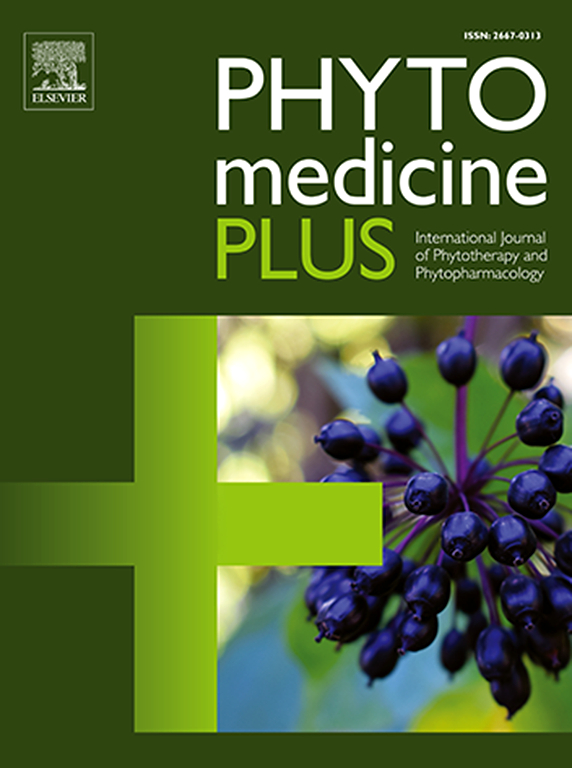Status of evidence on efficacy and safety of indian traditional medicine (AYUSH) for COVID-19: Protocol for a country-specific qualitative review and evidence map synthesis
Q3 Pharmacology, Toxicology and Pharmaceutics
引用次数: 0
Abstract
Background
The COVID-19 pandemic caught the world off guard despite the advanced medical systems and public health strategies. Throughout the pandemic, researchers have actively investigated the role of traditional medicines in the treatment of COVID-19. In India, where there is a rich heritage of traditional therapeutic practices encompassed under AYUSH, each system has assessed the efficacy of its remedies during this challenging time.
Objective
The aim of our study protocol is to develop a comprehensive framework for conducting a qualitative review of available studies, synthesizing an evidence map regarding the efficacy and safety of AYUSH interventions in managing COVID-19.
Study design
A systematic review without meta-analysis study design was undertaken for this study.
Methods
This protocol has been developed in accordance with the Preferred Reporting Items for Systematic Reviews and Meta-Analyses for Protocols (PRISMA-P) guidelines. A thorough search will be conducted across selected databases based on a well-defined search strategy. A predetermined set of inclusion criteria will guide the selection of studies for quality appraisal, and data extraction will be performed manually. The quality of the included studies will be evaluated using specific assessment tools developed by the National Institutes of Health (NIH).
Results
The protocol deveopment and the initial search process for the identification of potential studies were completed in January 2024. From February to May, two independent reviewers screened the titles and abstracts. The pilot data extraction was finalized in the first week of June 2024. Any issues encountered during the data extraction process were resolved, and the formal screening and data extraction were completed in June. Presently, the review team has started the quality assessment of the included studies.
Conclusion
The findings of the study will not only inform practitioners and researchers but also significantly contribute to a broader understanding of integrative health strategies, potentially shaping future approaches to public health crisis.
关于印度传统医学(AYUSH)治疗COVID-19的有效性和安全性的证据现状:针对具体国家的定性审查和证据图合成方案
尽管拥有先进的医疗系统和公共卫生战略,但COVID-19大流行还是让世界措手不及。在整个大流行期间,研究人员积极调查了传统药物在治疗COVID-19中的作用。在印度,AYUSH涵盖了丰富的传统治疗实践遗产,在这一充满挑战的时期,每个系统都评估了其补救措施的功效。本研究方案的目的是制定一个全面的框架,用于对现有研究进行定性审查,并综合关于AYUSH干预措施在管理COVID-19方面的有效性和安全性的证据图。研究设计本研究采用系统评价,未进行meta分析。方法本方案是根据方案系统评价和荟萃分析首选报告项目(PRISMA-P)指南制定的。将根据定义良好的搜索策略在选定的数据库中进行彻底的搜索。一套预先确定的纳入标准将指导质量评估研究的选择,数据提取将手工进行。纳入研究的质量将使用美国国立卫生研究院(NIH)开发的特定评估工具进行评估。2024年1月完成了方案制定和潜在研究的初步搜索过程。从2月到5月,两名独立审稿人筛选了标题和摘要。试点数据提取在2024年6月的第一周完成。解决了数据提取过程中遇到的问题,并于6月完成正式筛选和数据提取。目前,评审小组已开始对纳入的研究进行质量评估。结论本研究的发现不仅将为从业者和研究人员提供信息,而且还将为更广泛地理解综合卫生战略做出重大贡献,有可能塑造未来应对公共卫生危机的方法。
本文章由计算机程序翻译,如有差异,请以英文原文为准。
求助全文
约1分钟内获得全文
求助全文
来源期刊

Phytomedicine Plus
Medicine-Complementary and Alternative Medicine
CiteScore
3.70
自引率
0.00%
发文量
178
审稿时长
81 days
期刊介绍:
 求助内容:
求助内容: 应助结果提醒方式:
应助结果提醒方式:


